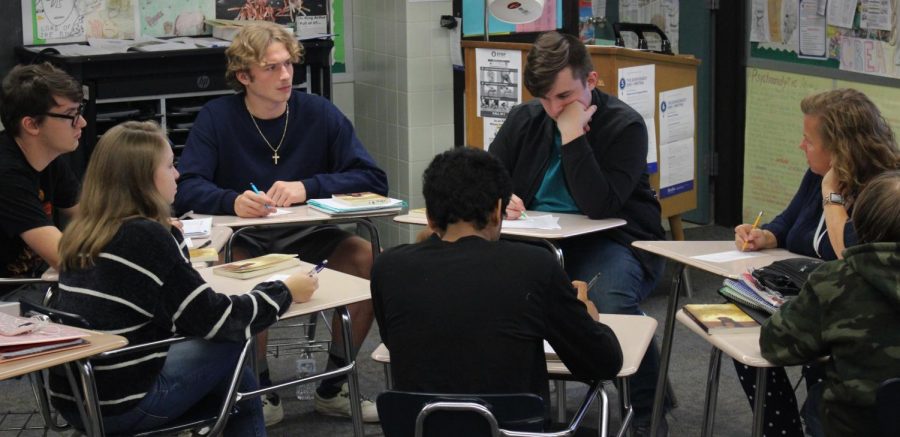Advanced Placement program places students on the path to college
According to YouthTruth, a nonprofit organization that partners with school districts to gather data, 87% of students in the United States want to attend college after high school; a majority of them, however, feel unprepared. CollegeAtlas.org, a digital news and information platform that empowers students and the academic community to make more informed decisions about higher education, has revealed that 30% of students drop out after their freshman year of college due to a variety of factors; the largest of these remains the fact that basic high school classes did not properly prepare these students, forcing them to face failure. High schools are attempting to combat this issue by offering options such as dual enrollment, but universities can be very selective about accepting these credits; many students also lack the transportation necessary to participate in such programs. What many students seek is an advanced high school class that will adequately prepare them for college.
The Greater Nanticoke Area School District is working to produce students who will be ready for the challenge of their first year of tertiary education by placing them in rigorous courses, thereby granting them an opportunity to gain credits that will transfer to the college of their choice. These classes are known as Advanced Placement (AP) subjects, and Greater Nanticoke Area is offering an increasing amount of them to benefit students. These courses’ focused and interactive nature has a profoundly positive impact on those who choose to take on the challenge that they present; as AP English teacher Mrs. Rachel Jeffries stated, “AP English Literature and Composition students will most definitely be uber-prepared for a college classroom. Rigorous reading schedules, demanding writing assignments, and student-led discussions are the norm here.”

AP classes, created by the College Board administration, are college-level classes taught at high schools. Similarly to regular college courses, AP classes are worth three credits; they last, however, for two semesters instead of one. To gain these credits, students must earn an acceptable score on the AP examination that is administered at the end of the second semester on a five-point scale. Though different educational institutions have their own criteria for the lowest transferable scores, a three is canonically considered a passing grade, with the College Board deeming those who receive it to be “qualified” in the according subject(s). Some colleges will accept this score, but students seeking to attend upper-level universities may need to attain a four, or a “very well qualified” grade—the equivalent of a B in a college course. A five is the highest score one can achieve on an AP exam; students who manage such a feat are considered to be “extremely well qualified,” comparable to earning an A in a college course. All students aspire to get a five on the exam, for they wish to be certain that their score will transfer to the college that they decide to attend (and it is, indeed, the only mark that some Ivy League schools accept for certain AP credits).
There are certain requirements to get into such classes at GNA. Students must, for instance, maintain an A average in a preceding course (e.g. a 94+ yearly average in Pre-Calculus is necessary for admission into an AP Calculus group); they must also obtain the permission of the respective teacher in order to be able to join the class. Students are typically required to complete summer work and must be prepared for graded assignments and assessments in the first week of school—and, of course, far beyond. As Nanticoke’s AP Calculus instructor Ms. Barbara Warman stated, “A student needs to be self-motivated, hard-working, and have excellent time management skills. An interest in the subject matter is also important. Additionally, students are expected to complete both summer assignments and additional independent assignments throughout each course.”
The journey through the Advanced Placement program began in the early ’90s for the Greater Nanticoke Area School District, when Principal John Gregorowicz implemented the first AP class at the high school. Under his administration, AP Calculus was taught to seniors by Mr. Bernie Zoranski. Though the process took some time, GNA went on to offer a second AP course in the late 1990s when AP English, introduced by Mr. James Carey, was added to the roster. Since then, GNA has further expanded its program, having provided four AP courses in 2016: AP U.S. History (APUSH) for juniors and seniors, instructed by Ms. Candice Muench; AP Biology for seniors, taught by Mrs. Dawn Marshall; AP Calculus AB for seniors, instructed by Ms. Barbara Warman; and AP English for seniors, taught by Mrs. Tonya Cumberland. As more and more students expressed interest in these classes, GNA decided to further extend its list of offered AP classes—primarily under Principal Amy Scibek. For the 2019-2020 school year, GNA has seven presently active AP courses: APUSH for juniors and seniors with Ms. Candice Muench, AP U.S. Government and Politics for seniors (also with Ms. Muench), AP Computer Science Principles for juniors and seniors with Mrs. Michele Wisniewski, AP Biology for seniors with Mr. David Prushinski, AP Calculus AB for seniors with Ms. Barbara Warman, AP Probability and Statistics for seniors with Mr. Nicolas Rauh, and AP English for seniors with Mrs. Rachel Jeffries.
During the 2018-2019 school year, the Greater Nanticoke Area School District was recognized for this list of classes when it earned a spot on the National Advanced Placement District Honor Roll. The program works to honor schools that have made efforts to enlarge their AP programs and is highly selective: only 373 schools from the United States and Canada are named. Greater Nanticoke Area was one of two districts from Luzerne County that were chosen to receive this bi-national distinction. The accomplishment has encouraged Nanticoke to cultivate and execute even greater intentions: in the future, GNA hopes to add AP Chemistry, AP Psychology, AP European History, AP Physics, and AP language courses to its subject list. It is a goal of the faculty to put these courses into action, for they aspire to provide the students with a variety of challenging classes that spark interest and a desire to learn. As Ms. Barbara Warman commented, “I would add AP courses to our curriculum based on student need and interest.”

In addition to making the National Advanced Placement District Honor Roll, students at GNA have performed exceptionally well on the examinations that mark the conclusion of their corresponding courses. This can be observed, for example, in the performance of the AP U.S. History students, whose mean scores have been on the rise over the past four years. The 2017-2018 class received scores that exceeded the national average, and the 2018-2019 cohort had a higher-than-average pass rate, with one individual obtaining a perfect score. Even students who did not pass the examination acquired a set of valuable skills, presenting them with exposure to a subject matter which is bound to be covered and utilized at length in university. For example, the APUSH students wrote (and continue to write) many papers throughout the year, thus fostering the writing skills that are notoriously essential in higher education. The course’s instructor Ms. Candice Muench noted, “AP students need to be willing to devote a substantial amount of time outside of the classroom to AP History courses. My AP students, especially in the AP U.S. History classes, have nightly assignments that require them to dissect and analyze every event in United States history. AP History students need to be established writers who are willing to polish their writing skills based on College Board writing rubrics, bringing not only their knowledge of history and politics to life, but exhibiting their ability to analyze and make connections across themes.” With regards to AP Calculus AB, many students who did not pass the AP Exam later went on to take the course in university with noticeable success—a factor for which they give Ms. Barbara Warman great credit. The Greater Nanticoke Area staff has many goals; the intention to have students accumulate the knowledge required to pass the rigorous courses and accumulate college credits, along with teaching them vastly beneficial skills for college and beyond, are only some of these.
By augmenting the AP course repertoire, Greater Nanticoke Area administrators and educators have dedicated themselves to creating a curriculum that continues to meet the needs of their students. The program has expanded rapidly in less than two decades, going from a sole class in the 1990s to seven in the present-day—much to the benefit of pupils, who have increasingly excelled over time and whose thirst for knowledge has only been amplified. “The bond developed in AP classrooms is like none other. Students see [a teacher’s] dedication to the content and [his/her] devotion to pushing them toward success,” APUSH instructor Ms. Candice Muench states, “I am blessed to work for a district that has allowed me to successfully experiment with College Board courses.” Though the addition of Advanced Placement courses requires an ever-growing abundance of mentors, GNA is determined to continue to find spaces in scheduling and work to shuffle schedules in order to maintain its position on the National Advanced Placement District Honor Roll, striving to earn untainted pride from both its alumni and the city of Nanticoke as a whole.


My name is Kayla Eckrote, and I am a junior here at GNA. I’ve always been a student here, for I have lived in Mocanaqua and Nanticoke my whole life....








